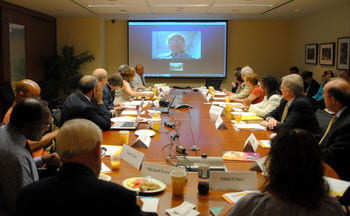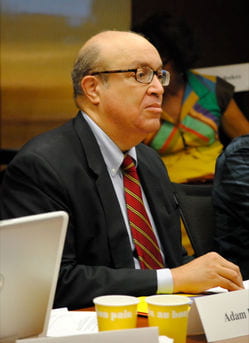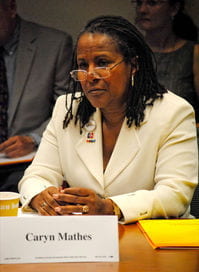 Public broadcasting executives, journalists, policymakers, and others met in USC’s Washington, DC office on Monday, July 25 to discuss growing threats to public broadcasting stations across the US. The program featured opening remarks by Geoffrey Cowan, director of the Center on Communication Leadership & Policy and was organized by Adam Clayton Powell III, CCLP’s senior fellow who has served in top positions at several commercial and public news organizations. USC Annenberg’s Dean Ernest J. Wilson III also participated in the forum.
Public broadcasting executives, journalists, policymakers, and others met in USC’s Washington, DC office on Monday, July 25 to discuss growing threats to public broadcasting stations across the US. The program featured opening remarks by Geoffrey Cowan, director of the Center on Communication Leadership & Policy and was organized by Adam Clayton Powell III, CCLP’s senior fellow who has served in top positions at several commercial and public news organizations. USC Annenberg’s Dean Ernest J. Wilson III also participated in the forum.
 Tom Thomas, Co-CEO of Station Resource Group, observed that while public broadcasters have always had aspirations that exceeded available resources, funding cuts at the state level have produced “enormous consequences” for public broadcasting in some states–particularly public television. “State money is the fourth largest source of funding,” noted Thomas. Powell (pictured right) has authored a number of articles on the CCLP blog documenting financial pressures at the state level that have resulted in a series of shakeups–sale of a regional network, closing of a major station, and a move away from PBS programming by two other major stations in Los Angeles and Puerto Rico.
Tom Thomas, Co-CEO of Station Resource Group, observed that while public broadcasters have always had aspirations that exceeded available resources, funding cuts at the state level have produced “enormous consequences” for public broadcasting in some states–particularly public television. “State money is the fourth largest source of funding,” noted Thomas. Powell (pictured right) has authored a number of articles on the CCLP blog documenting financial pressures at the state level that have resulted in a series of shakeups–sale of a regional network, closing of a major station, and a move away from PBS programming by two other major stations in Los Angeles and Puerto Rico.
Andrew Russell of PBS described public broadcasting audiences as “strong,” noting the challenges facing public broadcasters on the funding side. “I think the stress is on the financial model–the business model,” he said.
 The dialogue also included reports from the front lines, including an update from Caryn Mathes (left), WAMU-FM’s general manager. While many stations have cut back on local news coverage, WAMU managed to expand its reporting on local news and information. However, WAMU has postponed new programs and services because of funding uncertainties.
The dialogue also included reports from the front lines, including an update from Caryn Mathes (left), WAMU-FM’s general manager. While many stations have cut back on local news coverage, WAMU managed to expand its reporting on local news and information. However, WAMU has postponed new programs and services because of funding uncertainties.
On the topic of local news, Melinda Wittstock, Founder and CEO of Capitol News Connection explained that one of the questions her group aims to answer is how to produce differentiated local news at an affordable price. “Local isn’t just what happens on your street,” she said. “It’s what happens to it.”
George Rivera, executive producer of eHarlemTV, described receiving a “tremendous response” to his “hyper-local” program. “I believe that stories from our community’s point of view are of interest to the broader audience,” he said.
Throughout the conversation, the forum participants focused on identifying practices that would allow public broadcasting to thrive. “The mission of public broadcasting has never been greater,” said Joseph Burns of WETA. “More than ever you need a forum for civic discourse.”
The CCLP forum was presented with the participation of Current magazine, which covers public broadcasting.
Steve Behrens, editor of Current, offered a series of questions to consider going forward: “Who can lead change? Who has the power to make choices? What is actually working? How many people do you need to reach to have succeeded?”
CCLP will continue to follow these and other issues as it continues to report on public broadcasting developments.
Monday’s forum was the first in a series of meetings and studies that CCLP will organize on public broadcasting, its mission, and its financial and public support.
Head of the National Federation of Community Broadcasters, Maxie Jackson, presented his findings during the D.C. forum: